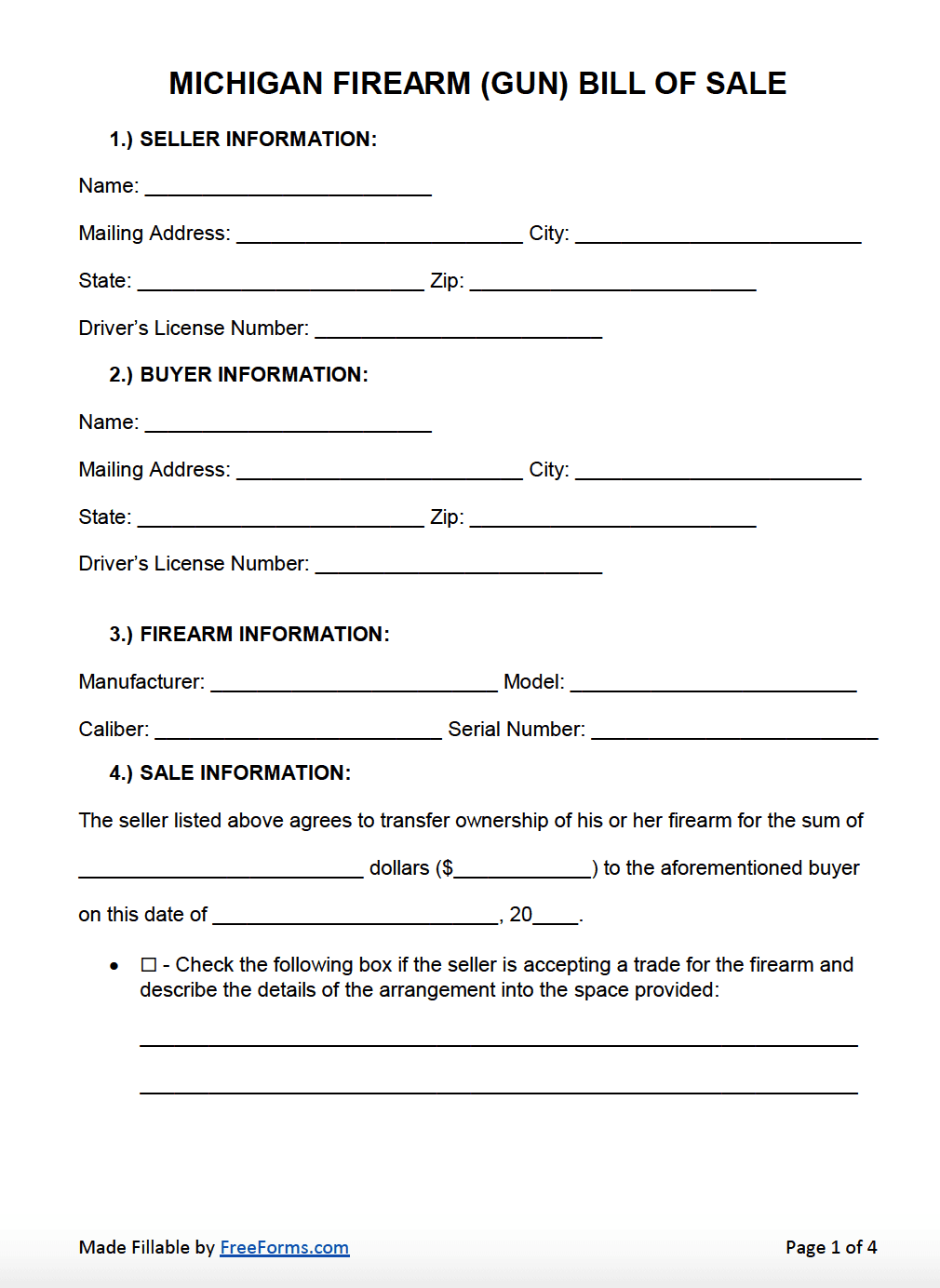The Michigan firearm (gun) bill of sale form registers in writing the transaction entailing the sale of a firearm in exchange for a confirmed dollar amount. The written document lists all vital information on the buyer and seller and the gun. The paperwork serves as a liability after transfer to protect the buyer and seller, should the weapon be used criminally.
How to Register a Gun
The regulation regarding the purchase and carry of a firearm in the state of Michigan is somewhat less lenient than many of the surrounding mid-west states. Although a long gun can be obtained with no purchase permit or required background check when carried out as a private sale, handguns call for a higher standard of restriction. When procuring a handgun, it must either be bought from a federally licensed dealer, or the buyer first gains access to a purchase permit (if you do not currently hold a Michigan Concealed Pistol License). To do so, you can effectively apply by attending your local sheriff’s office with a valid resident photo identification (or driver’s license) and fill out the required paperwork and safety exam.
There is no specified mandate to obtain an owner’s license for a weapon, but some districts will obligate firearm registration, so make sure to contact your local law enforcement agency to inquire. When acquiring a handgun from a federally licensed dealer with a permit to purchase or a concealed pistol license, the governing authorities will have a record of the sale, essentially registering the gun. Open carry of a firearm is allowed in sanctioned areas, such as approved hunting grounds, target ranges, and on an owner’s private property. To carry a gun in a vehicle will demand the requirement of a concealed pistol license.
How to Obtain a Concealed Pistol License
Lawful concealed carry of a firearm will obligate that all Michigan residents furnish an active Concealed Pistol License per Michigan Compiled Laws §28.425b. The license will further allow for the transport of a gun within the confines of participating reciprocity states. To qualify for a Concealed Pistol License, you must be a Michigan resident for at least six months, be 21 years of age or older, complete a firearms training course, and be able to pass a background check.
To apply for the license in-person, gather the following listed materials to deliver to your county clerk’s office:
- A completed Michigan Concealed Pistol License Application (Form R1-012) to be signed and notarized on-site.
- A certificate showing fulfillment of a hunter safety program approved by the state of Michigan.
- A passport-style color photo of the applicant.
- A fingerprint identification card (available for a separate fee on-location at the clerk’s office).
- A valid Michigan State driver’s license or identification card with an up-to-date home address for the applicant.
- Payment for license fees in the amount of $115.
The documentation will be sent out and processed, and you will be informed of your license status within a 45-day time-frame. Notification of licensure status will be relayed via mail to the home address provided on the application.
How to Write
Step 1 – Download the Adobe PDF form.
Step 2 – Seller Information – Input the information on the seller of the firearm:
- Name
- Mailing Address
- City
- State
- Zip Code
- Driver’s License
Step 3 – Buyer Information – Include the same information on the buyer of the weapon:
- Name
- Mailing Address
- City
- State
- Zip Code
- Driver’s License
Step 4 – Firearm – Type out the specifics concerning the firearm as follows:
- Manufacturer
- Model
- Caliber
- Serial number
Step 5 – Purchase Information – Finalize the details on the sale terms:
- Purchase Price (numerical)
- Purchase Price (written)
- Purchase Date
- Make a note of any trade involvement and signify the identifying information of any trade items as needed in the provided spaces.
Step 6 – Signatures – for the disclosure statement portions, as well as the signature sections to execute the document, make sure to make available a certified notary to overlook as the parties endorse. This will ensure verification that both involved individuals understand what they are signing and have the capacity to do so.



0 comments
Comments are closed.